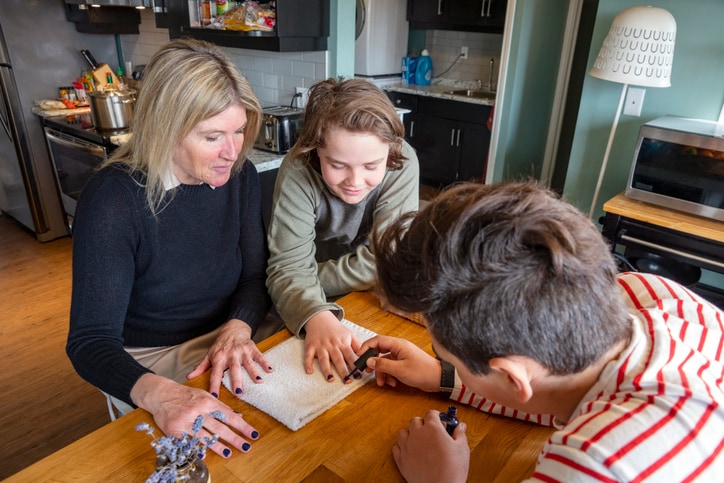Iris Kavanagh knows her 12-year-old daughter’s Facebook and email passwords and checks them regularly. The Santa Cruz, CA mom has been educating herself about kids and social media since 2008. Kavanagh wanted to make sure she understood the technology and could explain its risks during mother-daughter talks. “I wanted her to know that whatever she did online was going to be with her for the rest of her life.”
Even so, Kavanagh’s daughter was a victim of cyber-taunting last year during a Google chat session. She told her mom, and Kavanagh was tech-savvy enough to download the conversation and forward it on to the parents. The kids and parents got together to talk through their feelings and “became stronger friends because of it.”
Kavanagh says limiting technology wouldn’t have helped her daughter.
“If you ban cell phones or the internet, you’re not really dealing with the problem, you’re just dealing with the tool,” says Kavanagh.
If you think it’s too early to teach your kids about smartphone smarts, think again. Kids as young as five know how to use these gadgets. We talked to some experts for tips on how to help your child handle 5 common heartbreaking social (media) moments.
Scenario 1: Your tween is texting constantly. She says it’s school related, but you know it’s all drama
Parents should make sure the kid’s cell phone is charged in their room at night, says Barbara Coloroso, bestselling author of “The Bully, the Bullied, and the Bystander.” “You want to see who is texting your child at 2:30 a.m.,” says Coloroso.
Also, parents have more access to kid’s text messages than they think. “If the phone bill is in your name, you can track your child ‘s text messages.” Coloroso also advices that parents of tweens go through their child’s phone regularly and look at it with them to see what messages are being sent and received. “The middle school years are dangerous years,” she says. “Our kids have to know that we’re monitoring what they’re doing.”
Scenario 2: Your teen sees pictures on Facebook of a party she wasn’t invited to
Dr. Robi Ludwig, Care.com parenting expert, suggests encouraging your child to post about her own accomplishments to help boost her confidence. “Maybe she wants to text her friends about the A she got on a math exam, or charity work she did over the weekend, or put up photos from her winning soccer game.”
Social media can be a great tool to connect with peers. This is the chance to teach her to focus more on what she’s achieved and less on what others are doing Encourage her to remain Facebook friends with peers who give her support and encouragement, and unsubscribe to postings from some of the toxic people in her life. Her unsubscribed friends won’t know she isn’t seeing the posts, and its much less of a diss than “unfriending” can be. You can help her by following these steps Facebook provides. Parents can also show kids that there’s life beyond the 3 inch screen by creating a less wired family environment. Dr. Ludwig suggests limiting smartphones and computers during dinner time, and other family “together” times. An outright day-long ban may backfire because it may feel too restrictive. Brainstorm with your kids about other options. “Perhaps there could be a family game night, and the games are the old fashioned board games. Activities that are non-tech, while the computers or smart phones are temporarily banned,” Dr. Ludwig says.
Scenario 3: Seeing a Hate Page created about your child or a friend
Unfortunately, Parents need to educate themselves about technology, so they’re in a better position to protect their kids, says Coloroso. If this happens, you can contact Facebook and have them take down the page. Then help your child block the person responsible without responding directly to the bullying or escalating the conflict in any way. Next, learn how to restrict your child’s privacy settings to control who can view their profile. But the key is to also be available to talk to your child about how this affects him or her, and let him know you won’t restrict his social media privileges (which is often a huge fear).
According to statistics from the National Crime Prevention Council, more than 40 percent of teens were cyber-bullied in the last year, but only 11 percent told an adult that they were being harassed. “Many kids don’t tell when they are being cyber-bullied because they are afraid the parents will take away their internet access,” says Coloroso. Parents can learn more how to stop cyberbullying by visiting WiredSaftey.org. (Learn the 8 websites you should use to supervise your child online.)
Scenario 4: Learning your child teased someone online
Teens who tease online do it to get attention. You’re horrified and angry, but take a moment to try to understand where she’s coming from, says Coloroso. Acknowledge the behavior, talk it through, and reinforce compassion and empathy.”We need to keep ourselves connected to our kids,” says Coloroso.
This is the chance to teach your own child about kindness. Coloroso suggests three benchmarks to help your child navigate the online world. Before your child posts or texts, have them pause and look at what they’re about to send. Ask your child, “Is it true, is it necessary, and can I say it in a kind way?”
If your child is the one being teased, teach her to hit the pause button before she hits send, says Coloroso. Teach her not to respond to nasty messages and posts in the heat of the moment.
“If you don’t respond it drives them crazy,” says Coloroso who also suggests copying any nasty message, which may disappear later. You should get a copy of the sender’s IP address by clicking on the “full header” option of the email. Software such as eMailTrackerPro can also pinpoint IP addresses.
If the teasing is happening via text messaging, you can call your carrier at 611 and they can show you how to stop incoming texts. Or you can download the apps like Block’em or Word Bully.
Scenario 5: Your teen has posted provocative photos
This is the time to talk with your kids about appropriate internet boundaries, says Dr. Ludwig. You want to make sure you’re Facebook friends with your teen, so you can appropriately monitor what she’s posting. “You don’t want to stalk your child, but you do want to know what’s going on in her online life, including what she’s texting and posting to Twitter,” says Dr. Ludwig.
Talk to your child about impulsivity, and stress the idea that she doesn’t want to learn to regret her online posts.
Expectations of privacy are different than they were a generation ago. In order to help our kids stay safe, we have to teach them what’s okay to share and what isn’t. “Once you put something online, it becomes out of your control,” says Dr. Ludwig. “You don’t know who’s eyes are reading or judging.”
Overall, encourage kids to think about every post, tweet or text they send. Ask themselves: could this hurt anyone’s feelings – or hurt me if it gets in the wrong hands? If the answer is anywhere close to a yes or maybe, don’t send it. And parents, let your kids know you’re tracking their social media presence, but encourage smartphone-free time (for the whole family), and using these platforms to promote their accomplishments and good deeds.






